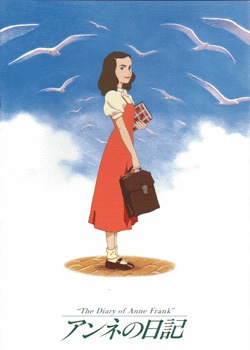 On June 12th, 1929, about ten-years before the start of World War II, Annelies Marie Frank was born to parents Otto and Edith Frank in Frankfurt, Germany. Rendered stateless by the Nazis in 1941, and without any means to flee the country, Anne and her family were forced into confinement for two-years in a cramped attic to avoid persecution. While staying there, Anne documented her life in a now famous diary, which has since been adapted into movies, plays, and even an anime.
On June 12th, 1929, about ten-years before the start of World War II, Annelies Marie Frank was born to parents Otto and Edith Frank in Frankfurt, Germany. Rendered stateless by the Nazis in 1941, and without any means to flee the country, Anne and her family were forced into confinement for two-years in a cramped attic to avoid persecution. While staying there, Anne documented her life in a now famous diary, which has since been adapted into movies, plays, and even an anime.
It was surprising to learn that an anime of Anne Frank’s diary had been made—by Madhouse, no less, one of my favorite studios. I’d known about Anne’s story for a while, but I avoided it because I feared that it might be too depressing for me to handle. Regardless, my curiosity for this especially unique adaptation eventually got the best of me, and I relented.
As expected, this story was difficult to watch. Even seemingly peaceful moments are underpinned by anxiety and melancholy that keeps you from ever feeling at ease. The presence of the Nazis encroaching the lives of Anne and her family are always felt even when they’re not seen. And Anne and her family weren’t the only victims of this time. There were countless other families and individuals across central-Europe who were made to endure similar struggles. It all ultimately begs the questions: Why did this have to happen? How could such paranoid hatred develop?
A lot of care was put into the production of Anne no Nikki. The character designs matched their real-life counterparts, and the animation was often inbetweened on twos, resulting in a lifelike fluidity atypical of anime animation. The soundtrack was minimalist, lightly enhancing the atmosphere of particular moments without being a distraction.
Furthermore, I appreciated the subtlety of the directing. People are portrayed as historical figures rather than as characters. A naturalistic approach is taken that resists the temptation to exaggerate for the sake of dramatic effect. The sedate pacing might be trying for less patient viewers, but a more energetic portrayal wouldn’t have rung true to the actual events that this adaptation drew from.
If I had to dig deep for a flaw, I’d say that there was an occasional tinge of sentimentality, which, considering the strong emotions that were already present, didn’t feel necessary. Despite this, the heart and salient moral lesson that Anne no Nikki paints more than compensates for any apparent flaws.
“It’s a wonder I haven’t abandoned all my ideals, they seem so absurd and impractical. Yet I cling to them because I still believe, in spite of everything, that people are good at heart. It’s utterly impossible for me to build my life on a foundation of chaos, suffering and death. I see the world being slowly transformed into a wilderness, I hear the approaching thunder that, one day, will destroy us too, I feel the suffering of millions. And yet, when I look up at the sky, I somehow feel that everything will change for the better, that this cruelty will end, that peace and tranquility will return once more. In the meantime, I must hold on to my ideals. Perhaps the day will come when I’ll be able to realize them!”
— Anne Frank, The Diary of a Young Girl